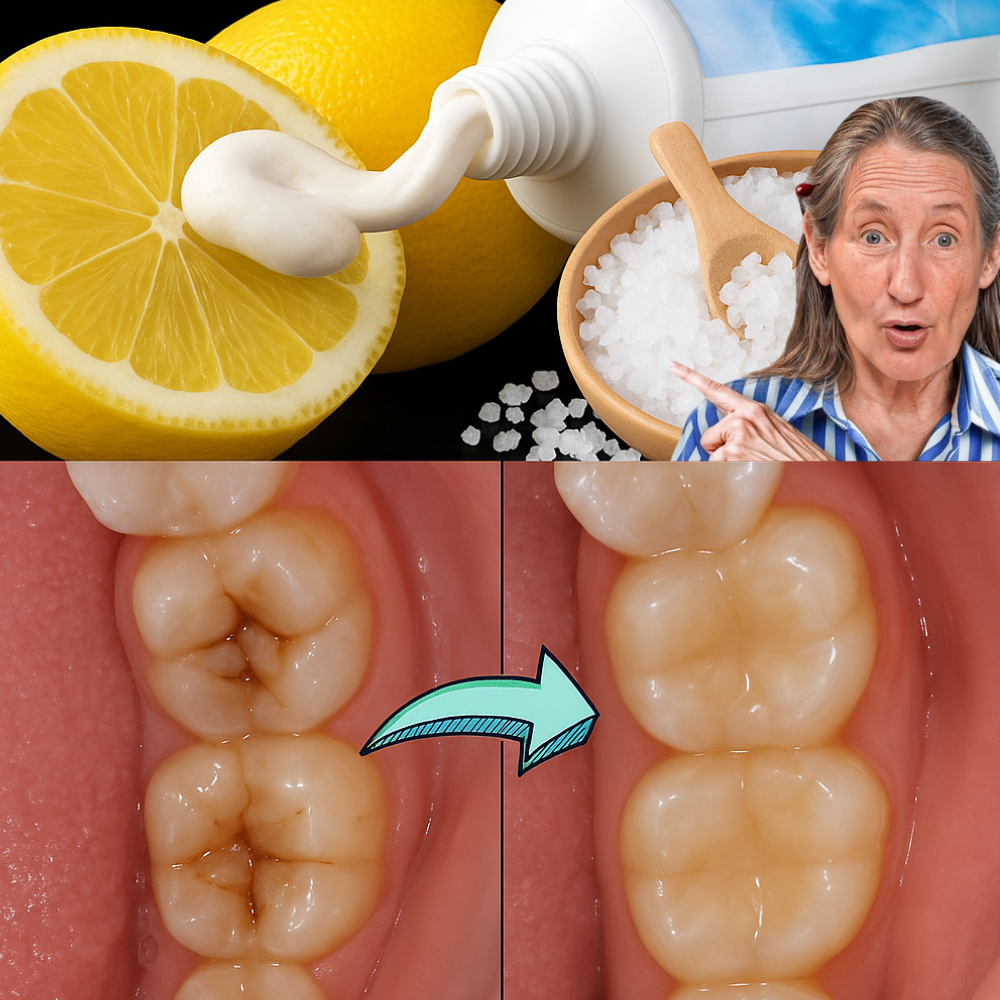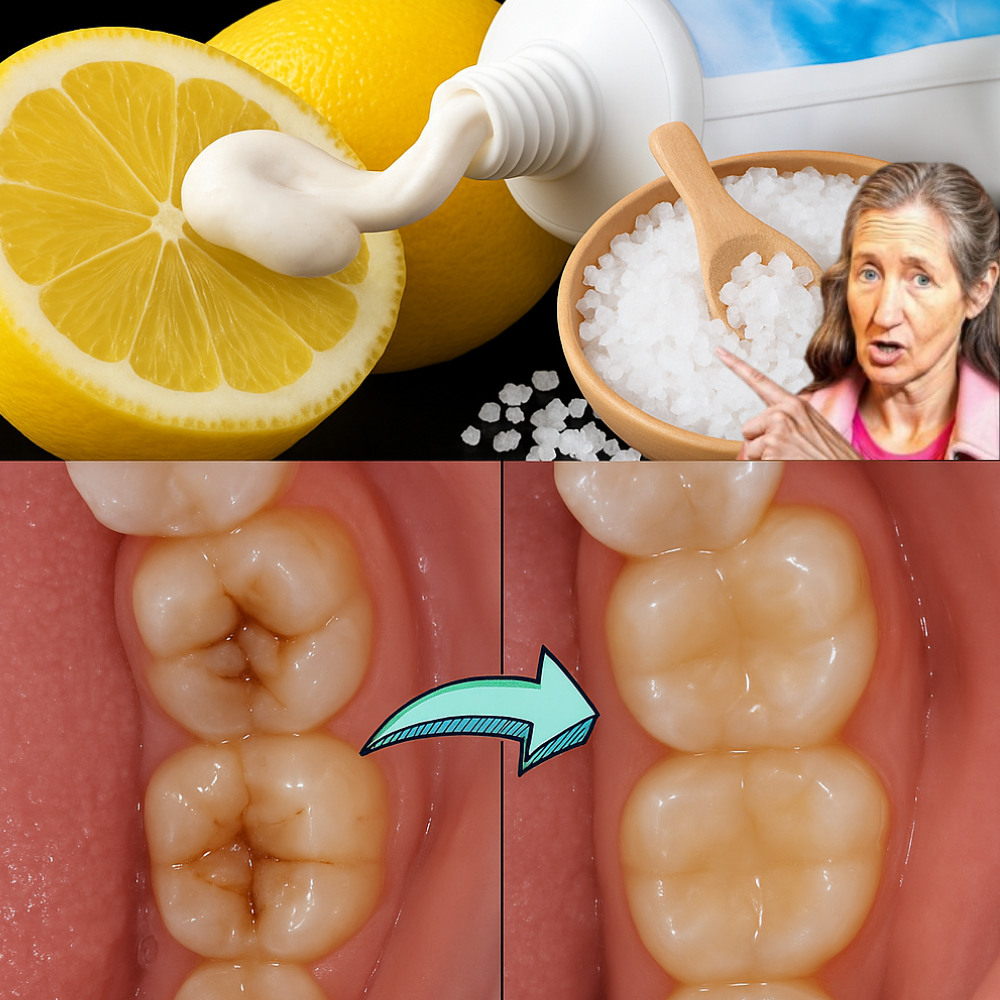Have you ever wondered if your body could quietly repair cavities—before you even feel a hint of pain? Imagine this: you go about your day, smiling, chewing, sipping coffee… all the while, your teeth are silently under attack by acids, sugars, and bacteria. But here’s the real surprise—your teeth may also be trying to heal themselves. That’s right. In its earliest stages, tooth decay isn’t a one-way road to the dentist’s drill. Your enamel can actually begin to strengthen and remineralize… if you know how to support it. 🌿
This article uncovers six smart, natural strategies to help protect and support your teeth—without harsh chemicals, invasive treatments, or expensive products. These gentle techniques are not only simple to follow, but they also work with your body—not against it. Ready to discover what your mouth has been waiting for?

🥬 1. Feed Your Enamel Like It’s Alive—Because It Is
Your teeth may look like hard, lifeless surfaces, but they’re part of a living system. What you eat doesn’t just affect your weight—it affects your smile. Enamel needs the right nutrients to defend itself and rebuild from early damage.
💚 Nutrients Your Teeth Crave:
- Calcium (in almonds, leafy greens, dairy): This mineral is the very foundation of strong enamel.
- Vitamin D (sunshine, fatty fish, eggs): It tells your body how to absorb and use calcium properly.
- Magnesium (found in whole grains, seeds, spinach): Strengthens overall tooth structure.
- Phosphorus (fish, lentils, eggs): Works hand-in-hand with calcium to rebuild enamel surfaces.
❌ Watch Out For:
- Sugary snacks and sweetened beverages: They feed harmful bacteria and weaken enamel.
- Acidic drinks like soda or citrus juices: These erode enamel faster than you think.
- Ultra-processed foods: They can upset the natural pH balance in your mouth and cause inflammation.
🥥 2. Start the Morning with Oil Pulling—A Ritual of Clean Balance
This ancient practice is as simple as it is powerful. Before breakfast, take a spoonful of coconut oil and swish it gently around your mouth for 10–15 minutes.
🌀 Why It Works:
- It helps draw out bacteria and toxins hiding between your teeth and gums.
- It freshens your breath naturally.
- It gives your mouth a calm, balanced start to the day.
Spit the oil into the trash, rinse your mouth with warm water, then brush as usual. Over time, many people say they feel cleaner, brighter—and more connected to their health.

🌿 3. Choose Toothpaste That Works With Nature, Not Against It
Most commercial toothpaste is filled with foaming agents and synthetic flavors. While these may feel clean, they don’t always help your enamel heal. Natural, remineralizing toothpaste can be a better option when you’re aiming to support early healing.
🧴 Look For Ingredients Like:
- Hydroxyapatite: A form of calcium that mimics your natural tooth enamel.
- Calcium carbonate: Gently polishes without scratching.
- Baking soda: Balances the pH in your mouth for a less acidic environment.
✨ DIY Tip: Want to go completely natural? You can make a homemade paste with coconut oil, baking soda, and a pinch of sea salt for gentle daily care.
🧂 4. Try a DIY Mineral Mouth Rinse—Soothing and Effective
Alcohol-based mouthwashes can be harsh and drying. Instead, try this easy mineral-rich rinse at home. It takes just one minute but can leave your mouth feeling fresh, calm, and supported.
🧪 Simple Recipe:
- ½ teaspoon sea salt
- ½ teaspoon baking soda
- 1 cup warm water
- (Optional) Add 1–2 drops of clove or peppermint essential oil
Swish for 30 seconds. Spit it out. Avoid eating or drinking for 30 minutes to let the minerals work their magic. This rinse not only helps with breath but also creates an environment that’s friendly to enamel and unfriendly to harmful bacteria.
🌱 5. Use Nature’s Helpers: Herbs That Love Your Mouth
Herbal support is one of the oldest forms of oral care—and it’s still powerful today. Certain herbs are well-known for their ability to help with bad breath, inflammation, and even bacterial control.
🌼 Top Herbal Allies:
- Clove oil: Traditionally used for soothing sensitive teeth
- Neem: Used for centuries to support healthy gums and balance bacteria
- Licorice root: May help reduce plaque buildup in a gentle, natural way
Always dilute essential oils in a carrier oil or water. A little goes a long way. Used with care, these herbs can refresh your mouth and calm inflamed gums—without harsh additives.
💧 6. Protect the Unsung Hero: Your Saliva
Saliva doesn’t get enough credit. It’s your body’s natural defense system, constantly working to wash away bacteria, neutralize acids, and rebuild enamel.
💡 Easy Ways to Boost Saliva Flow:
- Drink water consistently throughout the day (especially after meals)
- Chew xylitol gum to stimulate natural production
- Avoid tobacco and alcohol, both of which dry the mouth and reduce protective saliva
Dry mouth isn’t just uncomfortable—it can leave your teeth vulnerable. The more hydrated your mouth is, the more it can protect you.
🌟 The Takeaway: Early Healing Starts With Small, Gentle Shifts
You don’t need to overhaul your entire life to protect your smile. What you need is consistency, care, and a little wisdom from nature. These gentle strategies won’t reverse severe decay—but they can support your body’s effort to repair the earliest signs before they become bigger problems.
✅ Eat mineral-rich, enamel-friendly foods
✅ Avoid sugars and acids that erode your teeth
✅ Practice daily rituals like oil pulling or rinsing
✅ Use toothpaste and herbs that support—not stress—your enamel
✅ Stay hydrated and keep saliva flowing
🎯 Most importantly, keep in touch with your dentist. Natural strategies are most effective when paired with professional care. Together, they give your mouth the best chance at staying healthy—naturally.
Your smile is more than just teeth—it’s a living system. Give it the care, attention, and nourishment it needs, and it will repay you in confidence, comfort, and lasting health. 💛
📌 This article is for informational purposes only and does not replace medical advice. Always consult your dental care provider before making changes to your oral care routine.









